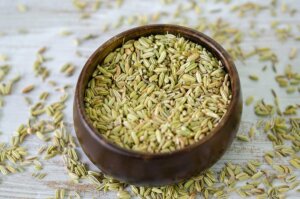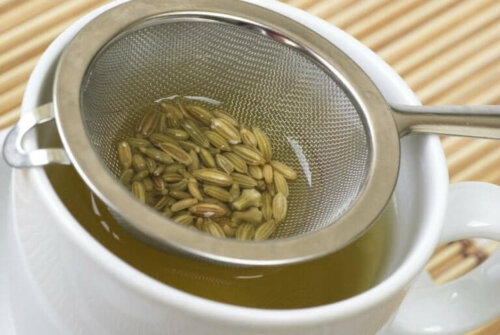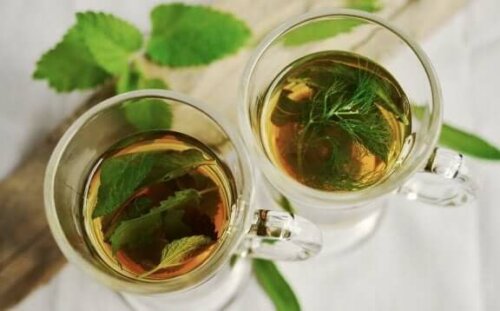Natural Benefits and Remedies of Fennel Seeds

Fennel seeds have become popular in recent years because of their nutritional properties. Fennel is a sweet-smelling herb, originally from the Mediterranean, which people have used for centuries for various natural benefits and remedies.
Although we add it to salads, sauces, and baked products, the most common way to ingest it is as a tea. This drink is also characterized by a strong aroma and a light licorice flavor. It’s relaxing and gives the body a significant amount of antioxidants.
Natural benefits and remedies
Fennel seeds have a slightly sweet taste, similar to aniseed or licorice. They’re collected from fennel plants (Foeniculum vulgare), which grow up to around 50 inches, have feathery leaves and yellow flowers.
They’re usually used to supplement the treatment of some diseases or health problems. However, we need more scientific evidence to make claims about its effects. In any case, anecdotal data on its application to health allows us to recognize certain benefits.
It helps fight infections

Improves sleep quality
Thanks to its relaxing action, fennel seeds are a good alternative for stimulating sleep. Its properties relax muscles, including those of the digestive system, helping to prepare the body before bedtime. It also reduces insomnia.
It stimulates the production of breast milk
Anecdotal evidence and even some references in medical literature agree that fennel helps stimulate the production of breast milk. For many centuries it’s been used as a galactagogue, a property that increases the quantity and quality of breast milk in breastfeeding mothers.
It relieves stomach upset

Fennel seeds are good for digestion, and have anti-inflammatory and carminative properties. Therefore, they’re excellent for reducing discomfort such as flatulence, diarrhea, and abdominal pain. They even decrease excessive acid segregation and prevent reflux.
It provides antioxidants
Drinking fennel tea is a natural way of bringing more antioxidant compounds to your body. As many of you will know, antioxidants attach to harmful molecules to cope with oxidative stress. They also reduce burdens on the kidneys and liver.
Refreshes your breath
The antibacterial properties of fennel seeds can help neutralize bad breath. Its compounds remove conditions that produce the bad odor and, in turn, regulate the pH of the saliva. Ideally, it’s best to drink the tea before bed and in the morning.
Fights constipation

Drinking fennel can help to relax digestive muscles. Therefore, it’s a good remedy to stimulate bowel movement and reduce constipation. It’s advised to use it at least twice a day.
Natural benefits and remedies using fennel seeds
In most cases, fennel seeds are consumed as a tea. This drink can be used to take advantage of all the properties mentioned. Pregnant women and babies are advised not to take it. Also, it shouldn’t be taken in excessive amounts.
Fennel seed tea

The traditional fennel seed drink concentrates much of its nutritional properties. Thus, it can be made in case of digestive problems, breast-feeding difficulties, sleep problems, or infections.
Ingredients
- 1 tsp fennel seeds (0.2oz)
- 1 cup boiling water (8.4 fl oz)
- Honey (optional)
Preparation
- Firstly, pour a teaspoon of fennel seeds into a cup of boiling water.
- Then, cover it and let it rest for about 10 minutes.
- Finally, strain it and, if you wish, add a spoonful of honey.
- Consume 2 or 3 cups a day.
Also read: Relieve constipation with the plum, fennel and flaxseed smoothie
Fennel and lemon tea
This drink is great for calming excess heartburn and inflammation. And because of its high amounts of minerals and vitamin C, it’s also great for raising defenses.
Ingredients
- 1 tsp fennel seeds (0.2 oz)
- Juice of 1/2 lemon
- 1 cup boiling water (8.4 fl oz)
Preparation
- Firstly, put a teaspoon of seeds in a cup of boiling water.
- Immediately juice half a lemon and add.
- Finally, cover the drink and let it rest for 10 minutes.
- Drink 2 cups a day.
Fennel seed rinse

To enhance the refreshing effect of fennel seeds when fighting bad breath we can combine them with a little mint. This plant helps reduce bacteria and neutralizes the bad odor left by some foods.
Ingredients
- 1 tsp fennel seeds (0.2 oz)
- 5 mint leaves
- 1 cup boiling water (8.4 fl oz)
Preparation
- Firstly, pour the seeds and mint leaves into a cup of boiling water.
- Cover and wait until it cools a little.
- Next, strain it.
- Then, use the liquid to gargle after brushing.
- Use it twice a day.
Do you ever use this ingredient? Now that you know everything about it, don’t forget to get some on your next shopping trip. As you can see, it’s easy to use and has interesting properties.
All cited sources were thoroughly reviewed by our team to ensure their quality, reliability, currency, and validity. The bibliography of this article was considered reliable and of academic or scientific accuracy.
- Rather, M. A., Dar, B. A., Sofi, S. N., Bhat, B. A., & Qurishi, M. A. (2016). Foeniculum vulgare: A comprehensive review of its traditional use, phytochemistry, pharmacology, and safety. Arabian Journal of Chemistry. https://doi.org/10.1016/j.arabjc.2012.04.011
- S.b, B., V.v, P., & A.h, B. (2014). Foeniculum vulgare Mill: A review of its botany, phytochemistry, pharmacology, contemporary application, and toxicology. BioMed Research International.
- Kaur, G. J., & Arora, D. S. (2009). Antibacterial and phytochemical screening of Anethum graveolens, Foeniculum vulgare and Trachyspermum ammi. BMC Complementary and Alternative Medicine. https://doi.org/10.1186/1472-6882-9-30
- Anwar, F., Ali, M., Hussain, A. I., & Shahid, M. (2009). Antioxidant and antimicrobial activities of essential oil and extracts of fennel (Foeniculum vulgare Mill.) seeds from Pakistan. Flavour and Fragrance Journal. https://doi.org/10.1002/ffj.1929
- Diao, W. R., Hu, Q. P., Zhang, H., & Xu, J. G. (2014). Chemical composition, antibacterial activity and mechanism of action of essential oil from seeds of fennel (Foeniculum vulgare Mill.). Food Control. https://doi.org/10.1016/j.foodcont.2013.06.056
- Oktay, M., Gülçin, I., & Küfrevioǧlu, Ö. I. (2003). Determination of in vitro antioxidant activity of fennel (Foeniculum vulgare) seed extracts. LWT – Food Science and Technology. https://doi.org/10.1016/S0023-6438(02)00226-8
This text is provided for informational purposes only and does not replace consultation with a professional. If in doubt, consult your specialist.








